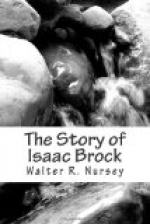At Prescott Brock sometimes took the Government schooner, paying two guineas for a trip, which might last a week, or caught one of the small “two-stickers” that carried freight between Kingston and Queenston. If much pressed for time, the batteau would be exchanged for a caleche—the stage-coach was as yet only a dream—and he would resign himself to a rude jolting over the colonization road through the forest that flanked the rugged northern shore of Lake Ontario.
These trips were a never-failing source of surprise and profit. The skill of the canoemen, the strength and endurance of the packmen, excited his admiration. What wonderful raw material! Given drill and discipline, what might not be achieved on the frontier with such craftsmen! The muscles, all whipcord, of these rugged Canadians, part coureur de bois, part scout, amazed him. One thing was not so evident as he could have wished. Their love seemed to be more for race and language, home and wilderness, than for King and country. Perhaps, as he said, if the safety of their homes were threatened, they would develop patriotism of the highest type.
But, after all, as to kings, “Who,” they naively asked him, “was their king? Surely they must be under two flags and two kings. Napoleon or George? Que voulez vous?”
As their hearts seemed to be as stout as their limbs, they would, he reflected, be unconquerable, these careless children of waste places. While Brock thus communed, he watched. There was little to choose between them—Narcisse, Baptiste, Louis, Jacques, Pierre—all strong as buffalo, all agile as catamounts.
They would lift the “pieces” from the dripping canoe and land them on the slippery rock. A minute later and Narcisse perhaps would appear, a bit bent, to keep balanced a bag of flour, a chest of tea, a caddy of tobacco and sundry packages of sugar or shot that made up the load resting on his shoulders where body and nape of neck joined. This load was supported and held together by a broad moose-hide band—a tump-line—strapped across his forehead, his upraised hands grasping the narrowing moose-hide stretched on either side of his lowered head, between ear and shoulder. Brock would watch these packmen as, thus handicapped with a load weighing from two to five hundred pounds, they set out across the rough portage, singing, and at a dog trot, following each other in quick succession. There was rivalry, of course, duly encouraged by Brock with a promise of tobacco to the first man in, but it was all good-natured competition, the last man chanting his laughing canzonet as loudly as the first.




